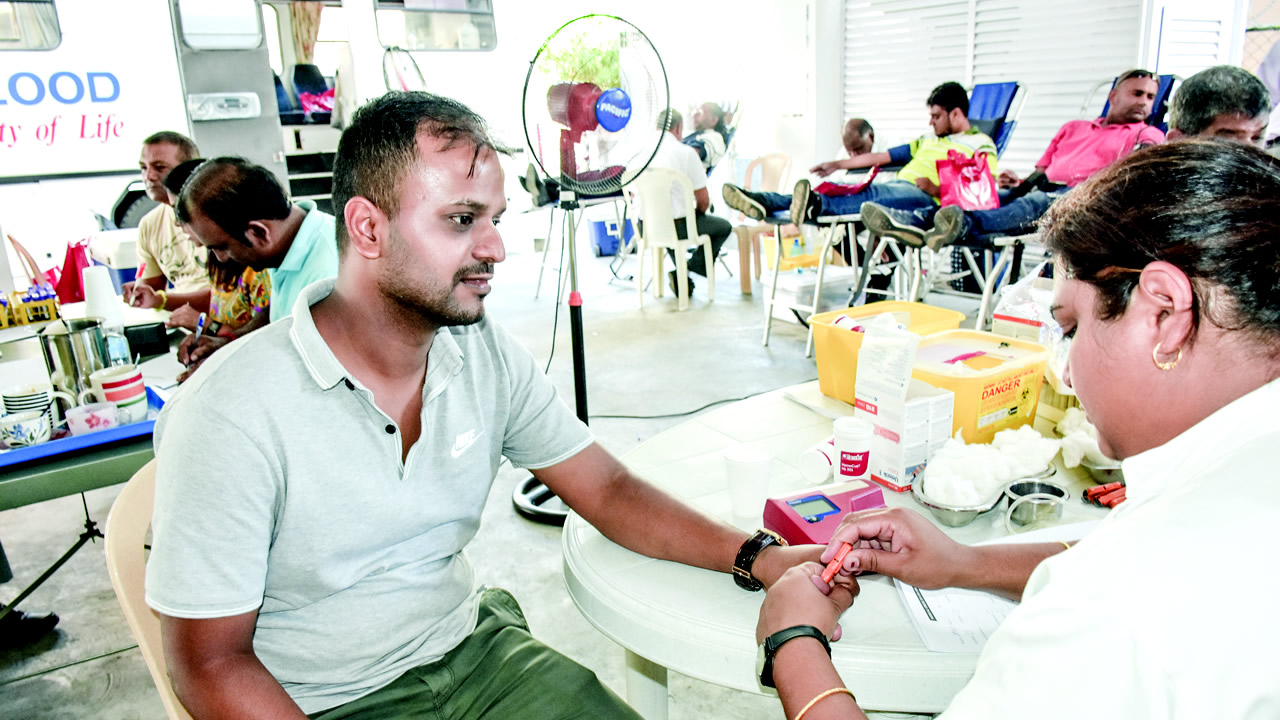
The National Health Accounts Report 2017 indicates that the country spent an estimated amount of Rs 16.5 billion on Non-Communicable Diseases, out of which, spending on cardiovascular diseases and diabetes were to the extent of Rs 3.57 billion and Rs 1.2 billion respectively. In 2017, diseases of the circulatory system (32.3%) ranked first among the most common causes of death.
Around 45% of the population is obese and around the same figure are people who are pre-diabetic. Heart diseases and Diabetes mellitus were the first two principal underlying causes of mortality in 2017, with 1,850 (18.7%) and 2,305 (23.2%) deaths respectively. Cancer and other Neoplasm of all sites taken together was in the third position with 1,371 (13.8%) deaths. Deaths due to Cerebrovascular diseases, which amounted to 809 (8.2%), was in the fourth position followed by Hypertensive Diseases with 505 deaths (5.1%).
Dr Reshma Ramracheya reveals that the prevalence of metabolic illnesses such as diabetes, cardiovascular diseases, obesity and cancer are escalating and there are so many reasons for this. “Urbanization or industrialization is probably one of the main reasons that has significantly contributed to our sedentary lifestyle, coupled with easy and cheap access to calorie-rich processed food, leading to the so called urban diabetes crisis. Likewise, Mauritius underwent rapid industrialization in the 1980s, changing not only where we live but also how we live, with more and more people being able to afford cars for their day-to-day commute. The public infrastructure has not catered for open grounds and parks where children and adults can run around in their respective towns and villages. There is neither provision nor the culture for children and adults to cycle safely to and from schools and the workplace, respectively.”
She states that we consume large amounts of food and beverages full of saturated fat and sugar, loaded with thousands of calories. “The staple Mauritian diet is mainly composed of carbohydrates with rice, ‘rotis’, ‘dhal pouris’ and ‘chapaties’ as the mainstay. All of these simply translate into energy in the form of calories, which remains unspent and ends up being stored as fat in the body, directly leading to obesity. Obesity significantly increases the risk of certain cancers. Likewise, increased body weight is the number one risk factor for diabetes. We now know that switching to a low carb diet can lead to a loss of over 7.4kg of body weight over just a year and reduction of HbA1c by 1.2% in people with type 2 diabetes. A lack of fruits and vegetables intake as well as a diet deprived of natural fibres have also been associated with colon cancers.”

Economic impact
NCDs or chronic diseases impose a large burden on human health worldwide. Mauritius is not spared either. Mauritius is a country which depend highly on its human resources. Economist Vishal Rughboor states that these diseases can have a severe impact on our economy. “It is a real challenge for Mauritius for having an ageing population along with a population with increasing diseases. It has a snowball effect on the economy, productivity, growth rate and long term development of the country.”
If our population faces various kinds of health issues, the government will need to spend millions in the health sector, he says. “Already millions are being spent to improve our health sector, now if the rate of various diseases has a tendency to increase, the amount allocated to health will have to increase. It will be more of a burden on the Government.”
Dr Vidushi Neergheen Bhujun and Prof Theeshan Bahorun from the Department of Health from the University of Mauritius states that the increasing emerging pattern of high levels of multimorbidity, that is people getting sick with two or more chronic conditions at the same time, can further impact the economy adversely. “For instance, a recent study conducted in Australia showed that diabetes not only impacts productivity, but that it could be an enormous economic burden. This study was one of the first to quantify actual productivity losses associated with diabetes. The NCDs and complications may prevent people from working entirely or increase absenteeism for those who work, thereby posing a threat to productivity. The problem may turn out to be more complex, as people with such diseases may face employment discrimination. A study found that diabetes had a profound negative effect on economic productivity due to early retirement, increased sick leaves, disability, and mortality.”
Associate lecturer in Associate Health Psychologist, Sameeha Monaff argues that one of the biggest challenges to the current healthcare system in Mauritius is the rapid increase in the number of people suffering from NCDs. “These constitute nearly 80% of the burden of diseases in the country. The burden of chronic diseases invariably challenges both the individual and the country, through direct and indirect costs. Living with NCDs take a toll on family budget, in terms of costs associated with diagnosis, treatment and care, for example consultations, medication, transportation to health care access and even holistic well-being of the individual.”
Dr Reshma Ramracheya also affirms that “With 40% of adult Mauritians being overweight, the authorities need to take note of the urgency of the situation. Type 2 diabetes is no longer limited to adults only, as the epidemic is also emerging in children and adolescents. Among children aged 5-18 years, 22% are overweight and have elevated blood glucose levels. As the prevalence of these chronic diseases increase in Mauritius, the economic burden on the State is expected to worsen. Mauritius also has to face the fact that diabetes and obesity will become more common in the next generation workforce. Consequently, employment and work productivity of individuals with diabetes are important issues for families, employers, and policy makers.”

Preventive measures
Unless effective action is taken, the national burden of NCD disability and death will inexorably continue to increase, says Dr Bhujun and Prof Bahorun. “In view of this complex condition, a multi-faceted and multi-institutional response is expected to dampen the situation. The World Health Organisation emphasizes that sustained actions should be directed both at individuals and families, as well as the broader social, economic and cultural determinants of NCDs for a better prevention. While an optimal diet, physical activity and no smoking have been advocated for many years as an important determinant, the focus should be directed towards the preventive effects of nutraceuticals and functional foods, which, over the years, have proved efficacy in reducing the onset of chronic diseases and in promoting well-being.”
According to Sameeha Monaff, NCD’s are preventable in most cases. “It requires a shift in people’s attitudes and preferences. The current behaviour such as the detrimental eating patterns, sedentary lifestyles and smoking among many Mauritians adds to the increasing burden of NCD in this country. This must change, as health is not the responsibility of the healthcare sector only. It has to be everybody’s business and priority.”
Dr Reshma Ramracheya states that key to reducing the risk of developing type 2 diabetes, pre-diabetes, cancer, and heart disease is to reduce excess body fat, especially around the waist. “It is too easy to advise lifestyle changes, but without the right support on how to incorporate the healthy behaviours in daily life, these would be meaningless. Weight-control strategies such as limiting high calorie food and drinks and choosing the right portion sizes, and getting regular and the right type of exercise should be made available. It is recommended that food low in calories should be substituted for foods high in calories rather than simply added to the diet. However, it should be stressed that the goal of a healthy eating habit is not to exclude modest amounts of food high in calorie density, such as oils, nuts, and seeds, which add nutritional value.”
Yashmee Dewoo : “Both mental and physical health are important at work”
 Yashmee Dewoo, Country HR Lead at Accenture Mauritius, highlights that the U.S. estimates that 77% of employees lost productivity stems from health-related issues but this is not only a question of productivity, we want to be an inclusive workplace, which provides the ideal environment for our people to feel safe and included. “Aging population is a social and economic issue happening worldwide. We are already aware of this trend and as human resources professionals and employers, we can already see new ways and methods of working emerging. We see that many companies are adopting flexible working arrangement, working remotely and also more freelancing.”
Yashmee Dewoo, Country HR Lead at Accenture Mauritius, highlights that the U.S. estimates that 77% of employees lost productivity stems from health-related issues but this is not only a question of productivity, we want to be an inclusive workplace, which provides the ideal environment for our people to feel safe and included. “Aging population is a social and economic issue happening worldwide. We are already aware of this trend and as human resources professionals and employers, we can already see new ways and methods of working emerging. We see that many companies are adopting flexible working arrangement, working remotely and also more freelancing.”
She states that both mental and physical health are important at work. “Mental illness is a diagnosable disorder which causes major changes in a person’s thinking, emotional state, and/or behavior. It disrupts the person’s ability to work and carry on their usual personal relationships. Mental disorders have profound social, cultural, and economic effects across all walks of life. Physical health exercise and movement throughout the day can have a tremendous impact on not just our physical wellbeing but our mental and emotional wellbeing as well – on the body, mind, heart, and soul. This is why we need to create an environment for our people to thrive and do their best every day.”
Yoosoof Jauhangeer : “The focus is not the same”
 Health and Safety Consultant, Yoosoof Jauhangeer states that having a workforce with serious diseases is detrimental not only on the productivity but also on the individual itself first. “For instance, people with diabetes, hypertension need special care. They need constant monitoring of their health even at work. Their focus is not the same as a normal person. Labour Act has recommended to companies to have a medical doctor for regular check of employees.”
Health and Safety Consultant, Yoosoof Jauhangeer states that having a workforce with serious diseases is detrimental not only on the productivity but also on the individual itself first. “For instance, people with diabetes, hypertension need special care. They need constant monitoring of their health even at work. Their focus is not the same as a normal person. Labour Act has recommended to companies to have a medical doctor for regular check of employees.”
He encourages companies to carry sensitization campaigns. “Some companies are taking the wellbeing of their workers seriously. While some are constantly organizing screening, others are encouraging workers to participate in yoga or Zumba. This will help employees to be in good health.”
Dr Ori Bhooshun : “Sensibilisation campaigns have been helpful”
Dr Ori Bhooshun, director of Health Services recalls that despite being a country with universal access, the population is prone to diseases because of the lifestyle. But however, the doctor states that the efforts of the Ministry of Health are bringing much changes. “Sensibilisation campaigns have been helpful so far. We can see that the rate of diabetics has stabilized. Life expectancy has increased. Recent statistics has shown that 23% of the population are doing exercises.” He argues that the Ministry of Health has its NCD Promotional Unit that works on promoting physical activities and do screening of students around the island.
Activities
Several activities will be organised to mark World Health Day 2019, observed on 7th April. The following activities would be held at the Trianon Convention Centre on 8th April 2019:
- the launching of a booklet on Non-Communicable Diseases (NCDs) and their risk factors;
- the screening and counselling for NCDs; and
- an exhibition on health related issues and cooking demonstration.
Sensitisation campaigns will also be held on TV/Radio as well as in Community Health Centres, Women Centres, Social Welfare Centres, schools, urban/rural community settings, on the risk factors of diseases and the preventive measures to be taken.
 J'aime
J'aime














